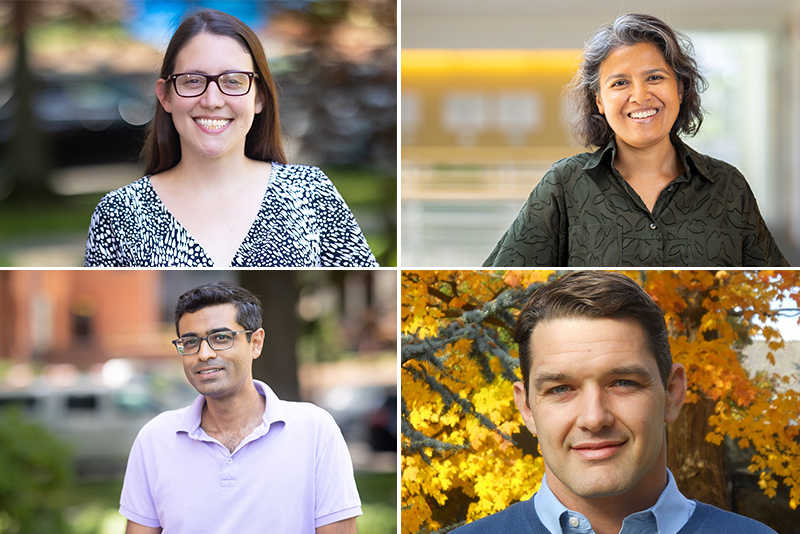A significant factor in economist Amit Khandelwal’s decision to join Yale’s faculty this year was the prospect of building something new.
Khandelwal, who came to Yale in July after 15 years at Columbia Business School, has joint appointments in the Department of Economics and the recently established Yale Jackson School of Global Affairs — the university’s first new professional school since the School of Management opened in 1976.
“It’s very rare to have a chance to build out a new school at such an established institution, particularly when the school is very well funded and has such a great core of students and faculty,” said Khandelwal, the Dong-Soo Hahn Professor of Global Affairs and Economics.
Khandelwal, who studies economic development and global trade, is one of four ladder faculty who came to Yale this summer in part to work at the Jackson School, which officially opened on July 1 and will offer its first classes this fall. The others are Jennifer Gandhi, a political scientist whose work focuses on authoritarian regimes, elections, and political institutions; Lauren Falcao Bergquist, a development economist who examines interventions to reduce poverty and support agriculture in Sub-Saharan Africa; and Christopher Neilson, an applied microeconomist who studies public policies and regulation in education markets.
“Landing these four world-class scholars in one year is a big achievement,” said James Levinsohn, the school’s inaugural dean. “Identifying, recruiting, and hiring faculty of this caliber is a team effort that takes a lot of time and hard work. It can be an uphill battle — we’re recruiting the best people in their fields who could work almost anywhere they choose.
“I’m very grateful to the many colleagues at Jackson and around campus who contributed to this year’s success.”
In addition to the four new faculty members, Mayara Felix, who studies development, trade, and labor markets, will join the faculty as an assistant professor of economics and global affairs in 2024 after she completes a postdoctoral fellowship at Yale’s Cowles Foundation for Research in Economics.
To have so many economists join the Jackson School in a single year reflects a quirk in the academic hiring process, Levinsohn explained. The school had hired no economists in the prior two years. The Jackson School’s faculty will have a balance of historians, economists, and political scientists, as well as others, he said.
Aside from the new hires, the school also added two faculty from within Yale: Pinelopi Goldberg, the Elihu Professor of Economics and Global Affairs and former chief economist of the World Bank Group, and Lorenzo Caliendo, the Won Park Hahn Professor of Global Affairs and Management, who is serving as the Jackson School’s deputy dean.
With the additions of Goldberg, Caliendo, and the four newly arrived scholars, the Jackson School’s tenure-track faculty now stands at 15 members, representing disciplines from the humanities and social sciences. (The Jackson School’s faculty members are jointly appointed with other schools and departments at Yale — an approach conducive to developing a multi-disciplinary faculty that enmeshes with the wider campus community.)
The school will seek to add three to four faculty members per year over the next few years until roughly 30 ladder faculty members are on board, Levinsohn said.
Prior to becoming a stand-alone professional school, the Jackson School was known as the Jackson Institute for Global Affairs. In 2019, the Yale Corporation, or board of trustees, approved plans to expand the institute into a professional school focused on inspiring and training a new generation of leaders to tackle challenging global problems by crafting thoughtful, evidence-based policy solutions.
Developing a top-flight faculty was a key component of transforming the institute into a professional school. But the hiring efforts are not limited to tenure-track faculty. The school is also adding to its roster of lecturers, who have an important role in the school’s teaching mission.
“We’re assembling a team of phenomenally talented lecturers,” Levinsohn said. “They are crucial to our success.”
New full-time lecturers include David Morse, who spent nearly 20 years working in the writing center at the University of Michigan’s Ford School of Public Policy. He will direct the school’s writing program.
Ardina Hasanbari, also a newly hired lecturer, previously taught economics at the University of Michigan. At the Jackson School, she will teach courses on fundamentals of economics and approaches to international development.
At the same time, the school has also welcomed three new senior fellows, distinguished practitioners with experiences in diplomacy, business, and public affairs, who teach courses, consult with students about their career ambitions, and conduct research informed by their experiences. The latest senior fellows are Hanscom Smith, who just retired from the U.S. Department of State where he last served as the Consul General to Hong Kong; Joyce-Ann Wainaina, the head of the Global Subsidiaries Group for Citi Sub Sahara Africa; and Robin Miller, the regional director for Africa at Dalberg, a global consulting firm.
Echoing Khandelwal, Levinsohn said that the opportunity to build something from scratch is an enticing incentive to academics.
“I think it attracts a certain kind of scholar who possesses an entrepreneurial spirit,” he said. “It’s an exciting enterprise that doesn’t happen often at places like Yale.”
But the school’s newness is not the only factor drawing top-flight scholars. For example, Bergquist, an assistant professor of economics and global affairs, said she was attracted by the school’s demonstrated commitment to the study and teaching of public policy.
“Jackson has a faculty that cares deeply about the impact of public policy,” she said. “They have practitioners actively involved in advancing policy and master’s students with experience working in the policy realm, which makes for a rich learning environment. Studying policy forms a core part of my research, which makes it fun and exciting to be at a school that values policy issues as much as I do.”
